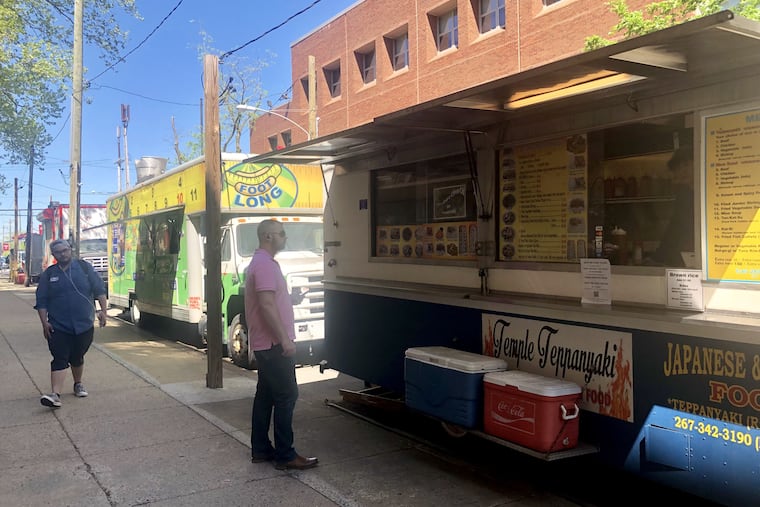L&I delays crackdown on Temple University food trucks
Some fear the enforcement of a 2015 ordinance would lead to more work and fewer customers for vendors.

The food trucks on Temple University’s campus won a temporary reprieve from nightly removal when the Department of Licenses and Inspections on Wednesday announced that it would delay enforcement of a 2015 ordinance, which requires the trucks to pack up and relocate every day rather than close up shop and remain overnight.
An Inquirer story posted online earlier Wednesday reported that owners of the 38 trucks were notified last week of the change — a shift in enforcement that students and truck owners fear will lead to lost customers and could eventually force some trucks out of business.
The letter told vendors that enforcement would begin April 29. After an outcry from vendors, who said the need to move nightly would create a hardship, Temple officials asked the department to delay enforcement until May 20, after Temple’s spring commencement.
On Wednesday evening, L&I indicated that the department would not act right away.
“As the department should have done prior to initiating enforcement of these provisions, L&I will engage over the summer with vendors and other stakeholders to explore and address their concerns,” spokesperson Karen Guss said in a statement. "We will not undertake enforcement until these discussions have taken place, and apologize for any confusion or distress.”
“Temple University maintains strong, working relationships with the nearly four dozen independent food vendors on campus,” said Christopher Vito, associate director of public relations for Temple. “The food trucks are a staple of the Temple experience, and have been for decades. We don’t want that to change.”
Guss said L&I did not enforce the ordinance previously because of staffing shortages. She said the ordinance ensures that streets stay clear for emergency vehicles, and that the trucks are regularly cleaned and maintained. She said her office had received complaints recently about the trucks remaining in place overnight.
“The idea was to let them know," she said of notifying the vendors. “We’re not trying to sandbag anyone.”
Sylvia Ndreu, who owns the Foot Long Truck parked on 12th Street with her husband, Billy, said traffic in the North Philadelphia neighborhood is a challenge. Though the food truck zone is marked with signs, students frequently park cars illegally, she said, forcing vendors to wait for a tow truck.
Parallel parking a large truck can take up to 20 minutes during rush hour, while traffic backs up, buses honk, and pedestrians jaywalk in the truck’s path, Sylvia Ndreu said. “These are my kids,” she said. “I wouldn’t be able to live with myself if one of them were hit.”
Earlier Wednesday, she said they were thinking of leaving if the ordinance was enforced.
“It’s a lot of mess,” said Nazim Sheba, who owns Brothers Pizza parked on 12th Street and has been vending for about 10 years. He said the definition of “overnight” was vague. “How about if I run 24 hours a day?” That, he said, was not an option for him. He said he was not sure if he’d leave Temple or comply.
The future of Cloud, a trailer-cart that sells coffee drinks on Norris Street near 12th Street, was less certain. Manager Angie Melchin said it “wouldn’t be sustainable” to move the cart nightly because the coffee equipment would be destroyed. Cloud, which opened about six years ago, has a sense of permanence, as it plugs into a dedicated electrical box mounted on a pole rather than relying on a generator. It is a clean operation, Melchin said, having passed a surprise health inspection on April 9.
As of Wednesday afternoon, more than 2,800 people had signed a Change.org petition created by Temple student Evan Kassof to “Save Temple food trucks.”
“It is common knowledge that many of the vendors at Temple do not move nightly, and the increased costs in maintenance, labor, and lost business due to the more limited hours of operation is likely to cause many of these vendors to close," the petition states. “The people who own and operate these food trucks are members of Temple’s community, some having been here over 30 years. These businesses are owned locally, many by minorities and immigrants. Food trucks create a sense of community on campus in ways the various Aramark-run food halls cannot.”
The petition asked City Council and Temple to work together to find a solution that would allow the trucks to stay in place, such as amending the ordinance to exempt the food trucks. It also requests that Temple president Richard M. Englert “make a decisive, public statement in defense of the food truck owners on campus.”